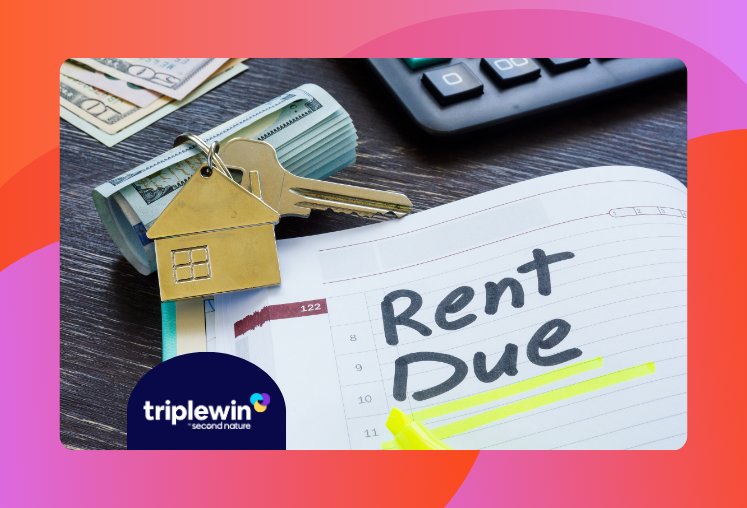AI is one of the hottest topics of the past year, especially in property management. Property managers all over the country are trying to get up to speed on what it is, how to use it, and why. So what is AI for property management, and how valuable is it, really?
AI is best positioned to help property managers by supporting and automating a lot of administrative or repetitive tasks. It’s also a great resource for helping to analyze and understand performance metrics and to gain insights from data. More and more software and service companies are building AI into their solutions, helping users to leverage AI more effectively than ever before.
Think about tasks like screening residents, coordinating maintenance, and communicating out key messages about rent collection, due dates, and policies. All of these can be assisted by AI, leaving you to spend more time on strategic efforts. Keep in mind, AI is not here to replace property managers, it’s just here to make them more efficient.
In this post, we’ll explain the benefits and opportunities that PMs can see with AI, along with some of the best AI tools for property management.
Benefits of AI for property management
AI does a lot of things, so sometimes it can be difficult to figure out what specifically you should be using it for. For property managers, there are plenty of practical use cases, from marketing and lead generation to scheduling and compliance.
Task automation
Artificial intelligence is very good at automating routine or repetitive tasks. Think about invoice processing, maintenance scheduling, showings coordination, inspections, and more. AI can take on a lot of these tasks, giving you more capacity to dive into strategic planning. It can also help with more complicated tasks like compliance monitoring and fraud detection. Not only is that one less task you have to handle, but it also helps ensure financial security.
Better communication
AI tools can also enhance the way that you communicate with residents and clients. You can use it to help understand maintenance requests, automate follow-up communications and satisfaction surveys, and schedule repairs. All of this helps build a better resident experience, which can increase lease renewals and decrease vacancies.
Faster screening
AI is great for automating background checks, credit evaluations, and rental history analysis, and some of the leading tools in the industry are able to analyze applicant data to predict lease default risk. All of this helps to ensure that property managers select reliable tenants more efficiently.
Predictive maintenance
Predictive AI is also particularly useful for things like preventative maintenance and estimating future maintenance costs. For example, when combined with internet-connected hardware, some AI tools can assess property conditions and flag upcoming maintenance issues before they occur. Whether you’re trying to predict plumbing failures or minimize HVAC repairs, AI can help.
Targeted marketing
Marketing is one of the most prominent areas where companies are leveraging AI. Modern tools can help write property descriptions, build websites, and syndicate listings to get more applicants faster.
Review management
AI can also help solicit and respond to customer reviews. By analyzing resident satisfaction, artificial intelligence tools can pinpoint the best moments to automatically ask for reviews. Plus, newer tools can also craft responses to reviews based on the content and sentiment, making sure every review is followed up on.
8 Best AI tools for property management
There are hundreds, if not thousands, of AI tools available that property managers can evaluate. To simplify things, we’ve collected eight of our favorites here to give you a sense of what’s available. Feel free to browse this list, do your own research, and see what fits best for your company and your workflow.
1. TenantCloud

Best for: Applicant screening
TenantCloud has a fully-featured, robust resident screening tool that goes beyond a simple credit report. In fact, with a proprietary algorithm, TenantCloud can actually predict the risk of an applicant defaulting on their lease or causing other problems.
Fully compliant with the Fair Credit Reporting Act, TenantCloud offers multiple ways to view report data, while also validating applicant identity and running a full background check. While TenantCloud offers a full suite of tools, applicant screening stands out from the rest.
Key features:
- Flexible reporting options based on your specific needs
- Identity validation, income verification, credit check, and background checks
- Optional County Criminal Records Search for deeper research
- Flexible pricing based on company size and door count
- Lease default risk analysis
2. AppFolio Realm-X

Best for: Automated communications
Our partner AppFolio is widely known as one of the largest property management software providers on the market. With Realm-X, AppFolio has entered the AI space to help property managers save time on manual tasks. In particular, Realm-X thrives when tasked with communications to residents.
With a single prompt, property managers can generate comprehensive, customized emails to residents based on specific criteria like lease term, date of renewal, or rent price. The tool also helps automate maintenance scheduling, application review, and lease renewals.
Key features:
- Embedded into AppFolio natively
- Reimagined inbox to prioritize and respond to key messages
- Detailed workflow automation
- Natural language chatbot
- Communication generation
3. EliseAI

Best for: Leasing management
EliseAI is designed to automate the mundane parts of the leasing cycle so that you can fill your units with highly qualified, satisfied residents. With a built-in customer relationship management tool, Elise organizes all of your resident data, reports, and workflows.
Elise offers integrated tour scheduling, a chatbot to handle inbound requests, and the ability to automatically recommend units to specific applicants based on square footage, number of bedrooms, budget, amenities, outdoor space, and more. It serves as a comprehensive prospect management tool, superpowered by AI.
Key features:
- Automatic responses to inbound leads
- Smart tour scheduling
- Personalized unit recommendations based on size, budget, amenities, and more
- 24/7 customer support for your residents and applicants
- Built in CRM
- Data center with robust reporting
4. RealPage AI Screening

Best for: Applicant screening
RealPage AI Screening is designed to move beyond just measuring an applicant’s ability to pay, and instead look at their willingness to pay. With comprehensive AI integration, RealPage reaches a deeper level of screening and understanding applicants.
RealPage’s solution promises to reduce bad debt, delinquencies, and evictions using powerful proprietary data.
Key features:
- Integrates with any property management software platform
- Leverages RealPage history of over 30 million lease outcomes
- Predictive scoring model for applicants
- Risk Advisory Services to optimize risk threshold
- Criminal and financial history checks
5. Showdigs

Best for: Leasing management
Showdigs aims to take the manual and repetitive parts of the leasing process off your team’s plate. The tool is focused on the applicant experience, offering real-time automated communications and a chatbot to answer applicant questions. All of this is personalized to the individual, helping to increase conversion rates to residents.
Showdigs also puts a heavy emphasis on security and fraud prevention. With AI-driven facial recognition, age verification, and ID verification, the tool weeds out scam applications so you can focus on the individuals who actually want to rent from you. All of this is backed by a U.S.-based call center for support when your team has a question.
Key features:
- Personalized search process for residents
- 24/7 automated communications to keep leads warm
- Advanced security measures and scam prevention
- ID check and facial recognition to verify identity
- U.S.-based on-demand call center for support
6. Happy Property: Maintenance

Best for: Maintenance coordination and inspections
HappyCo has been a well known name in the property management space for nearly a decade, particularly for their intuitive inspection tools. Now, in the AI era, they’ve taken their offering to the next level. Their maintenance and inspection tool automatically schedules inspections, routine maintenance, and preventative repairs. HappyCo is also mobile-first, allowing your team members in the field to see everything they need.
Happy Property: Maintenance also offers automatic work order generation, using AI to pull all the necessary details from a maintenance request and pass it on to your vendor of choice. With automated scheduling, it’s one less thing your team has to worry about.
Key features:
- Customizable inspection and maintenance templates
- 24/7 support for residents
- Automatic inspection and maintenance scheduling
- Integration with popular property accounting software
- Digital make-ready board to expedite turns
- Comprehensive reporting and document management
- Automated scheduling
7. Convin

Best for: Customer and resident support
There are plenty of AI tools out there that aren’t specifically designed for property managers, but are still valuable nonetheless. Convin is one of them. Convin is designed to increase customer retention through real-time guidance on live phone calls.
Convin integrates with your phone support system to offer support agents real-time insights on customer behavior, needs, and challenges. The result is a better informed support team, happier customers, and higher customer retention. If your company is small and doesn’t have a dedicated support team, Convin can still help with inbound calls to your main business line.
Key features:
- Real-time customer insights
- Customer audits for behavior and compliance
- Immediate prompts to answer complex customer questions
- Built-in agent training for new support agents
- Relevant knowledge base information to help solve customer challenges
8. SOCi Genius Reviews

Best for: Review management
SOCi Genius Reviews is an artificial intelligence-powered tool for responding to customer reviews, both good and bad. Reputation management is key for property managers, but can sometimes take up a disproportionate amount of time. SOCi is here to fix that.
SOCi is designed to respond to reviews by reading tone and sentiment, then replying appropriately in your own brand voice. Each review response is personalized, on-brand, and contextual. It also offers reports to spot trends in customer feedback so that you can make changes to your business in order to delight more customers.
Key features:
- Brand voice training to make sure all replies are on-brand
- Integrates with multiple review sites to spot all reviews
- Personalized responses to generate maximum engagement
- Emerging trend reports
- Automatic or personally selected responses
Simplify property management with Second Nature
Artificial intelligence can help property managers focus on the things that matter. If you want to save time, boost revenue, and create happier residents and clients, Second Nature’s Resident Benefits Package can help.
With everything from Group Rate Internet to on-demand pest control and a move-in concierge, the RBP helps maximize the resident experience while minimizing the work your team spends on manual tasks.
See Second Nature in action: request a demo today.




